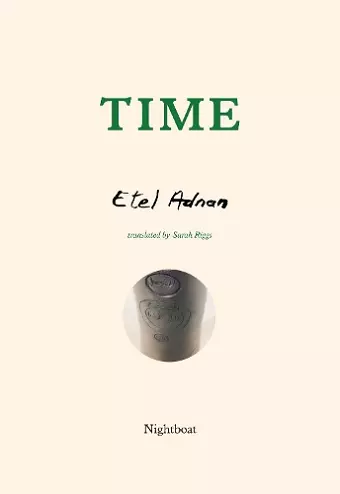Time
Etel Adnan author Sarah Riggs translator
Format:Paperback
Publisher:Nightboat Books
Published:4th Jul '19
Should be back in stock very soon

Galleys sent to print magazines in advance of publication, finished book sent to list of reviewers created in collaboration with the author, twitter, instagram, Nightboat blog and catalog, NYC and Bay Area book launches.
An arresting new translation of poems, originally written in French, by one of our greatest philosopher poetsWINNER of the INTERNATIONAL GRIFFIN POETRY PRIZE WINNER of the BEST TRANSLATED BOOK AWARD FINALIST for the 2020 LAMBDA LITERARY AWARD On October 27, 2003, Adnan received a post card of a palm tree from the poet Khaled Najar, who she had met in the late seventies in Tunisia, sparking a collection of poems that would unspool over the next decade in a continuous discovery of the present moment. Originally written in French, these poems collapse time into single crystallized moments then explode outward to take in the scope of human history. In Time, we see an intertwining of war and love, coffee and bombs, empathetic observation and emphatic detail taken from both memory and the present of the poem to weave a tapestry of experience in non-linear time.
"A fragmentary, aphoristic examination of night in all its illuminating darkness from a Lebanese-American poet who is also an admired visual artist."—David Orr, The New York Times Book Review, "Best of 2016 Poetry" "Renowned Lebanese-American writer Adnan maps consciousness in a book-length poem that explores night in all its permutations. Though she is more elliptical and fragmentary here—and less narrative-driven or referential—than in previous work, these poems engage in a daring, meditative exploration of perception and her own experiences. Adnan does this with a courageous interiority that becomes universal as the text unfolds. Memory is a particularly notable leitmotif as it relates to identity, whether personal or collective. 'I measure my memory of things, but not memory itself, as the present is also overflowing,' she writes. These internal and societal memories lend themselves to queries about history, landscape, and the nature of consciousness. Adnan posits that memory is not a 'storage room. It’s not a tool for being able to think, it’s thinking, before thinking.' As the book progresses, memory becomes increasingly knotted with loss and mortality: 'It was said that people mattered, which we did, and they lost their shine.' Adnan never provides clear answers, but this prevents her wide-ranging assertions from becoming didactic; her evocative imagery and interwoven repetitions serve to create another memory—one that will linger with the reader long after the text’s conclusion."—Publishers Weekly "Adnan’s Time is a book that crosses continents, encounters wars and heartbreaks, and looks brazenly at one’s own mortality. And these poems do exactly what Adnan states, 'I would like to reflect like a / buoy, thrown out from the depths / to the luminous mortal surface / of the sea.'"—Jennifer Firestone, Tarpaulin Sky "There is a lot happening in these meditative postcards, from bombs dropping in Beruit to a return to Greece, sculptures or stripmining in California, composing a sequence of lyric sketches aware of and very concerned with how easily humanity turns against itself and its own interests, from the larger issues of planetary survival, to the intimate matters of how one person treats another… Yet her poems are filled with such a wonder and an openness, one that shows a wisdom, and, despite everything, an optimism and heart."—rob mclennan, rob mclennan's blog "Through this rejection of boundaries, Adnan delivers an incomparable magnitude of emotional wisdom on the uncertainties that press on through life, writing both clarity and complication into our experience of reality."—Zeena Yasmine Fuleihan, Ploughshares "Adnan poetically navigates the currents of desperation and hope with a clarity placed on the page in short stanzas that we can pick up and roll over in our minds again and again. Like the short lines written on the back of a postcard, the aphoristic quality of these verses allows them to take on different lives. They can be worked over with a different temporality as we return to them for multiple readings, as we explore how they interact with the preceding or following ones, and as we observe how they take on new shapes."—Emma Gomis, Asymptote Journal "Time is a place where language creates the meaningful space between souls, and the great threat to the truth. Time is a place where communication is sacred, where 'love is the subversion of / death', true living, and the body is a communicator of the self. 'Describe the body / if you can / and you will see how unlikely / your soul is.' The body then too is essential to language, to communication, to the 'inbetween' as 'it bursts with life and lasts / briefly.' And its greatest threat is time. Adnan urges we 'listen to the sound of [our] arteries.' She means everything has something to tell us. Everything is offering us an inbetween to come alive in, and we only have so long."—Erintrude Pieta, Kenyon Review
ISBN: 9781643620046
Dimensions: unknown
Weight: unknown
144 pages